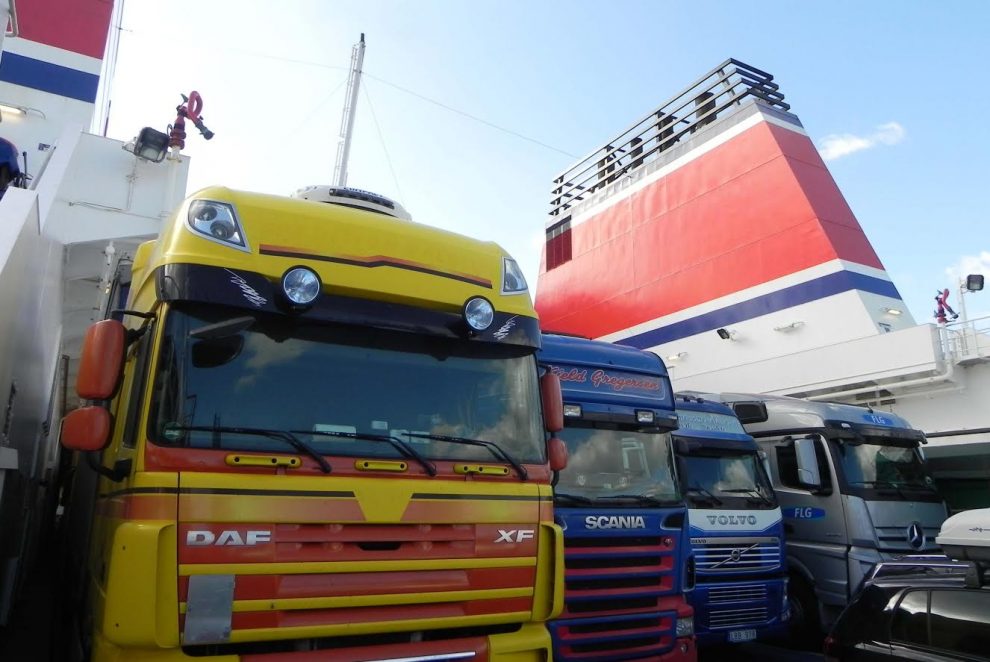TRADE negotiations between the UK and EU continued in London last week.
The talks, aimed at reaching agreement on the future relationship between the two after December 31, appear no further forward. The EU has, however, significantly upped the ante between Westminster and Brussels.
The EU announced it will impose full border customs checks from January next year. The chief trading port between the UK and Europe (to Dominic Raab’s horrified surprise in his former post as Brexit Secretary) is Dover.
If the EU insists on customs checks on goods entering from the UK, there will be delays in Calais. Delays in Calais will inevitably lead to delays at Dover. Because of the physical constraints of the Port at Dover and the relatively poor road transport infrastructure leading to it, delays at Dover could lead to severe traffic problems on the town’s approach roads and also on the wider road network in England’s south east.
The Government, to howls of anguish from Conservative MPs in the south of England, is already preparing significant traffic control measures and advancing plans for a massive lorry park in Ashford, Kent, which voted 60-40 to leave the EU and knew what it was getting.
AS IN DOVER…
The chief ferry ports in Wales are in Holyhead, Fishguard, and Pembroke Dock: all of them will be affected by the new customs procedure, which runs a coach and horses through the Prime Minister’s guarantee of no border in the Irish Sea.
Stena has already expressed concern about the limited space available to it to hold lorries at Fishguard and Holyhead. Former border check areas in Holyhead were built over and physical constraints at Fishguard militate against further expansion there.
The situation at Pembroke Dock is slightly different, in that there remains room to expand the holding facilities due to the Royal Dockyard’s physical footprint.
Any delays, however, would have a continuing knock-on effect on the speed at which freight could be carried from the Port without a seamless customs procedure.
PM SAID NO CHECKS
Last December, PM Boris Johnson disavowed the content of a Treasury document which said border checks on goods transported from the island of Ireland would be necessary.
He claimed that under the deal he negotiated no checks were necessary and the expert report was ‘wrong’.
The Government has long since reneged on promises regarding trade between Northern Ireland and the UK mainland and now the EU is ensuring Mr Johnson’s government sticks to the agreement it negotiated, presumably in good faith, or leaves without a deal.
“Government-commissioned research for the Port of Dover carried out by University College London concluded a 70-second questioning and inspection of lorries entering Britain would lead to six-day-long queues,” said WTO Director Keith Rockwell.
“UK Government analysis says average trade costs will rise by 13% (10% on non-tariff barriers) and they predict a 37% decline in trade volume.”
Mr Rockwell also pointed out that the WTO would have a say over any attempt to strike an interim deal with the EU ahead of thrashing out final details on tariff agreements and market access.
A CHANGE OF TUNE
Until last weekend, the Westminster Government insisted that claims there would be customs checks were so much hot air. However, over the weekend, Cabinet Office Minister Michael Gove appeared on television, on radio, and in print, to set out how the Government proposes to tackle an entirely foreseeable problem of its own making.
Having engaged in fanciful suggestions that the UK would use non-existent technological solutions to cross-border trade, the meat finally met the metal as the Government faced up to the outcome of its failure to abide by the terms of an agreement it signed only last October.
Mr Gove promised £700m to address the issue. It was not clear whether the whole of the £700m was new money or whether the jobs the investment is supposed to create were already accounted for in Westminster’s so-far-failed attempt to recruit Border Patrol staff. Some of the money for ports’ infrastructure had already either been spent or announced previously.
Whatever the answer, the problems are clear.
Goods will pass more slowly through ports with knock-on effects for the UK’s supply chain and manufacturers. Haulage companies face significant problems in complying with the limits on drivers’ working time if delays prove intractable. Increased haulage costs and bureaucracy will, inevitably, lead to price rises for products’ end users and ordinary consumers.
HALF-BAKED DEAL NOT DONE
While the Prime Minister spent much of November and December’s General Election campaign trumpeting his ‘over-ready’ deal, since the election his government has tried to distance itself as much as possible from what it agreed upon with the EU in October 2019. Mr Johnson’s deal now appears not so much ‘oven-ready’ as half-baked.
The current suggestion is a so-called pre-lodgement model, where customs declarations are submitted electronically in advance, before a truck is allowed to enter the port and board a ferry.
Companies have to get a reference number from a new and untested IT platform which, with fewer than six months to go to the transition period’s end, is still being developed.
The UK Government’s record in the procurement and delivery of major IT projects is un-encouraging.
In light of the COVID-19 pandemic, the UK Government has given traders a six-month grace period on complying with new red tape for EU imports. However, the EU has said it will impose full controls on exports from the U.K. as soon as it completes its split from the bloc, due on Jan. 1.
INDUSTRY REACTS
Commenting, RHA chief executive Richard Burnett said: “RHA members, and traders in general, need clarity on how they will be expected to run their businesses from January 2021.
“What worries us is that at the moment, the UK hasn’t hired anything like the number of customs agents needed to process the new form-filling.
“The UK is very slow off the starting blocks on hiring thousands of staff to do this vital work. If we don’t tackle this fast it’s a recipe for disruption to the supply chain post-transition which affects us all.
“Even if the new agents are hired trained by 31 December, firms still don’t know what forms will be required, how they should be completed, who should complete which forms, or where they will need to be sent.
“This is vital information that firms need to have as soon as possible, and should already have received if they’re to have enough time to prepare for the new trading arrangements with the EU.
“The RHA is again repeating its demands for clarity from the Government, who simply must provide this vital information if the UK supply chain is to continue to operate smoothly from January 1, 2021.”
Richard Ballantyne, Chief Executive of the British Ports Association, welcomed Mr Gove’s announcement of further invest, but added: “Borders infrastructure of course means there will be some impact on freight and potentially flows of traffic. We therefore pressing for the pragmatic enforcement of such processes so that trucks and cargo are not held up at our ports. Of course there is still a huge amount to prepare for and operators across the freight and logistics sectors will need to understand what will be required and what this will mean for their businesses.
“Port operators are keen to see the detail of our future borders arrangements. The Government is setting out its new Border Operating Model and a new publicity campaign for the freight sector and we look forward to discussing these with officials.
“About half of our trade is with the EU and so this is why we need to get the arrangements right.”















